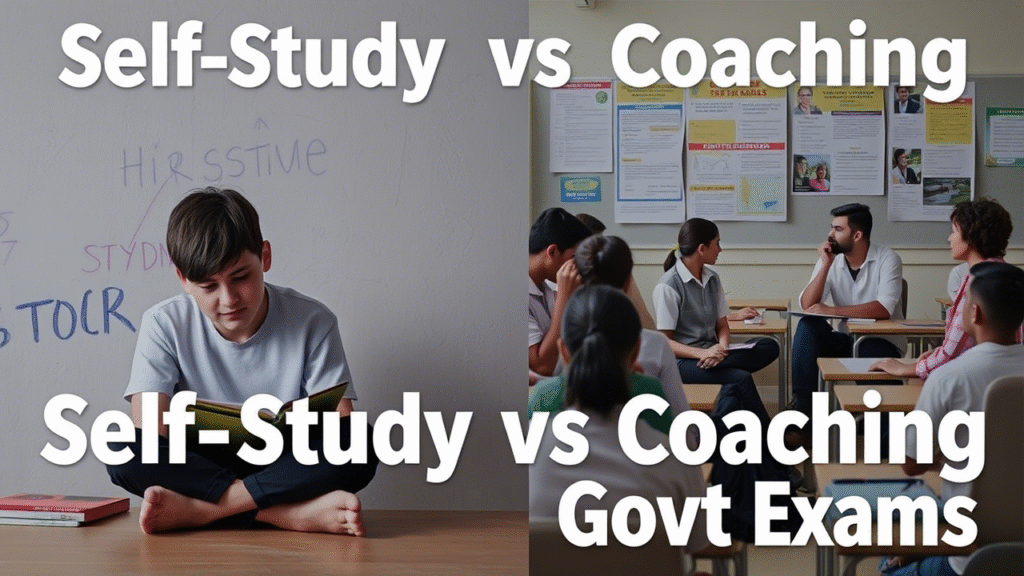Government exams in India and beyond—such as UPSC, SSC, Banking, Railways, and State PSCs—are highly competitive. Every year, millions of aspirants aim to secure prestigious roles in public service. But one question almost every candidate faces at the beginning is: Should I opt for self-study or join a coaching institute?
In this article, we’ll dive deep into the pros and cons of self-study vs coaching for government exams, discuss factors to consider, and help you choose the path that aligns with your learning style, goals, and budget.
🔍 Understanding the Basics
What is Self-Study?
Self-study refers to independent learning without formal instruction. Candidates rely on books, online resources, video lectures, mock tests, and personal discipline to prepare for exams.
What is Coaching?
Coaching refers to structured guidance provided by professional institutes or tutors. Coaching can be offline (classroom) or online and often includes a study plan, curated notes, and mock tests.
✅ Benefits of Self-Study for Government Exams
- Cost-Effective
One of the biggest advantages is the low cost. Most government exam resources are available online or in bookstores for a fraction of what coaching centers charge. - Flexibility in Schedule
You can create a personalized timetable that suits your energy levels, peak productivity hours, and commitments. - Tailored Learning Pace
Self-study allows you to spend more time on your weak areas and skim through topics you’ve already mastered. - Resource Abundance Online
From free YouTube lectures to platforms like Unacademy, BYJU’S, and Examrace, there’s no shortage of quality content. - Builds Self-Discipline
When you manage everything—planning, studying, testing—you naturally build discipline, ownership, and confidence.
❌ Limitations of Self-Study
- Lack of Direction: Without proper guidance, students may waste time figuring out what to study or rely on poor-quality materials.
- No Immediate Doubt Clearance: You might get stuck on difficult concepts or lose time researching answers.
- Motivational Challenges: Prolonged isolation can affect motivation and consistency, especially during long prep periods.
✅ Benefits of Coaching for Government Exams
- Structured Syllabus Coverage
Coaching institutes follow a systematic curriculum, helping students cover all sections efficiently. - Expert Guidance
Teachers with years of experience offer shortcuts, tricks, and strategies that are not always available in textbooks. - Peer Learning Environment
Studying with other aspirants creates a competitive environment and enables knowledge sharing. - Regular Tests and Feedback
Most coaching programs conduct weekly mock tests, helping students benchmark their performance. - Motivation and Mentorship
Mentors keep you motivated, track your progress, and push you toward consistency.
❌ Limitations of Coaching
- Expensive: Coaching can be prohibitively expensive, especially in metro cities. Fees often range between ₹50,000–₹2,00,000.
- One-size-fits-all Approach: Not every student learns at the same pace. Some may feel left behind or overwhelmed.
- Time Constraints: Fixed class timings may clash with your job or college schedule.
- Commuting Hassles: For offline coaching, you may waste hours in daily travel, impacting your energy and productivity.
📊 Self-Study vs Coaching: A Comparative Table
| Factor | Self-Study | Coaching |
|---|---|---|
| Cost | Low/Free | High (₹50k–₹2L) |
| Flexibility | High | Low (Fixed schedules) |
| Guidance | Self-dependent | Expert mentoring |
| Motivation | Self-driven | Peer and mentor driven |
| Resources | Online/offline | Pre-curated study material |
| Performance Tracking | Self-assessed | Regular tests & feedback |
| Personalization | Fully customizable | Limited |
🧠 When Should You Choose Self-Study?
Self-study might be your best option if:
- You have strong self-discipline and time management.
- You’re a repeat candidate already familiar with the exam pattern.
- You prefer learning at your own pace and exploring multiple resources.
- You’re on a tight budget.
Pro Tip: Use tools like Notion, Evernote, or Google Calendar to organize your study plan. Follow daily revision and take weekly mock tests to measure progress.
🎯 When Should You Go for Coaching?
Consider coaching if:
- You’re a beginner and need clear guidance on syllabus and strategy.
- You want structured learning and expert mentorship.
- You struggle with consistency and motivation.
- You want to learn shortcuts and exam-specific tricks.
Pro Tip: Choose coaching that offers online flexibility, access to recorded classes, and personal mentorship. Platforms like Unacademy, Testbook, and Byju’s offer hybrid options with doubt-clearing support.
💡 Hybrid Approach: The Best of Both Worlds?
Many successful candidates combine coaching + self-study. For example:
- Use coaching for core concepts and guidance.
- Use self-study for revision, mock tests, and personal notes.
This blended approach ensures you get expert input while customizing your strategy to fit your pace.
👣 Final Thoughts: What’s Right for You?
There is no universal answer to the self-study vs coaching debate. It ultimately depends on your:
- Learning style
- Budget
- Time availability
- Current knowledge level
- Motivation and focus
Remember, success in government exams is 80% consistency and 20% strategy. Whether you choose self-study or coaching, what matters most is showing up every day with a focused mind.
🔚 Conclusion
Choosing between self-study and coaching is a crucial decision that can shape your exam journey. Analyze your strengths, weaknesses, and resources before you commit.
Whatever you choose, make sure to:
- Set clear goals
- Track your progress
- Stay consistent
- Revise regularly
- Stay mentally and physically healthy
And most importantly—believe in your ability to succeed.


